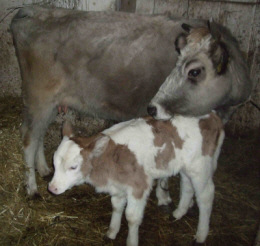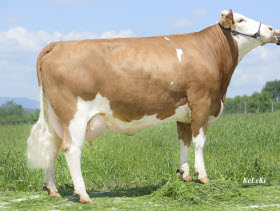



Illawarra
History
Illawarra cattle have taken their name from the Australian aboriginal word for a piece of land 50 miles south of Sydney, land locked between the Pacific Ocean and what was once a near impenetrable escarpment which rears abruptly to the west.In Australia dairying began as an industry in the 1840's, up till then cattle had mainly been produced for beef.
The early settlers had for the most part, cleared the Illawarra area with the assistance of convict labour. All breeds, types and colours of cattle had been introduced into the area.
Cattle grants from Government and private herds reached the Illawarra. These included Longhorn Durhams, Shorthorn Durhams, Red Lincolns, Red Ayrshires and Jerseys. However, three members of the Osborne family from Northern Ireland had, since 1829, laid the foundations of a dairy industry, and in doing so, the evolution of the breed the Australian Illawarras. The Osbornes imported the best cattle, promoted the first Agricultural Show at Wollongong and encouraged others in forming a dairy industry.
The Australian and Californian gold rushes provided the impetus for an expansion of the industry and the Illawarra area took up the demand for butter and other dairy products, and dairy has remained an important Illawarra industry ever since.
The Illawarra breeders were credited with having a flair for stockbreeding and an “eye for a good beast”. The 1860's saw increased recording of breeding details and facts, which noted the importation of several outstanding bulls bought to suit the environment.
In 1898 the embargo was lifted allowing a fresh wave of cattle imports. Breeders introduced Jersey, Guernsey, Kerri Dexter, Friesian, Shorthorn and Ayrshire bloodlines and it was from this amalgamation that the Australian Illawarra dairy cattle descended.
One Ayrshire bull, from Victoria, named “The Earl of Beaconsfield” proved outstanding when mated with cattle of the Illawarra. The progeny was magnificent and amongst the most celebrated was a cow called “Honeycomb”. Claimed to be Champion Dairy Cow of the world in the early nineties, she was also invincible in the show ring and winner of all the milk and butterfat awards. This was the cow that inspired the Illawarras, and the breeding programs began revolving around Red and Roan Shorthorns and Ayrshire bulls. Studs became more prevalent and spread to many other parts of Australia including Queensland.
In 1910, dairymen met at Kiama to establish another Herd Book, under the title Illawarra Dairy Cattle.
Milking Shorthorn and Illawarra Dairy Cattle Societies continued to flourish and expand throughout all Australian States. In Queensland the two breed Societies amalgamated to form the Illawarra Dairy Cattle Association of Queensland. This lead to further interstate amalgamations until, after protracted negotiations over many years, a national body called The Australian Illawarra Shorthorn Society was formed in Brisbane in 1930. For many years they were referred to as the Illawarra Shorthorns, or “the A.I.S. cattle”.
Now the term Illawarras is commonplace and the Society is called The Illawarra Cattle Society of Australia. The “Shorthorn” was dropped from the name because it caused confusion to some overseas buyers, who associate Shorthorn with dual-purpose animals. International recognition has consolidated the breed worldwide.
Characteristics
Illawarra cattle can be a rich red colour with a bit of white on the flanks or roan, other colours such as broken colours or black and brindle are not allowed. The breed has strong dark hooves and dark pigmentation which helps protect from skin cancers and sunburnt teats. They are a medium sized animal with a confirmation that increases in depth towards the hindquarters with a sharp, clean outline.Illawarras produce large quantities of milk in excess of 40 litres per day, the milk has moderate fat and high protein. Other favourable attributes of this breed are its adaptability to varying climatic conditions, the calving ease being one of the most noticeable features as they calve unattended and their pelvic formation being suited to the job. Illawarra cows can keep producing calves every year into their early teens which overall provides a very sound investment.
Statistics
Comparative
Distribution
Illawarras are one of the top ranking dairy cattle breeds in Australia.References (the above information was cited from the following sites)
www.illawarrasqld.com.au


